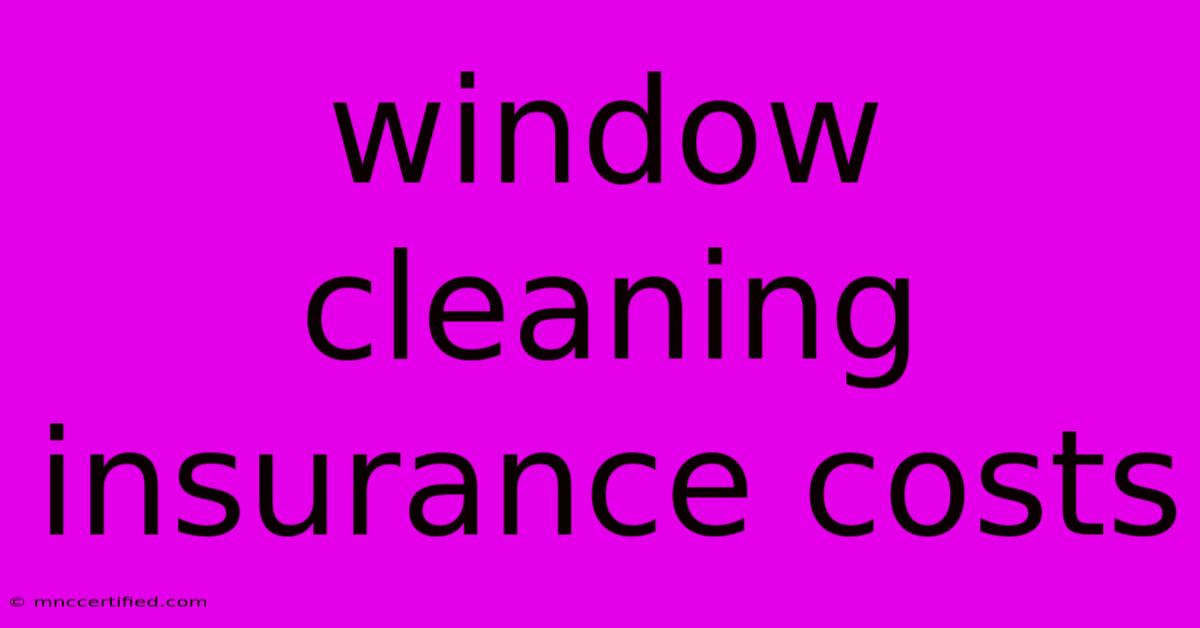Window Cleaning Insurance Costs

Table of Contents
Window Cleaning Insurance Costs: A Comprehensive Guide
Window cleaning is a physically demanding and potentially risky job. Accidents can happen, leading to property damage or injuries. That's why securing the right insurance is crucial for both individual window cleaners and established companies. But how much does window cleaning insurance cost? The answer, unfortunately, isn't a simple number. Several factors influence the final premium. This comprehensive guide breaks down the costs and helps you understand what to expect.
Factors Affecting Window Cleaning Insurance Costs
Several key factors influence the cost of your window cleaning insurance policy. Understanding these will help you get a more accurate estimate and potentially secure a better deal.
1. Type of Coverage:
This is perhaps the most significant factor. Different policies offer varying levels of protection.
-
General Liability Insurance: This covers bodily injury or property damage caused by your business operations. For window cleaners, this is essential, protecting against claims if a window is broken or someone is injured on the job. This is often the minimum insurance you should have.
-
Commercial Auto Insurance: If you use a vehicle for your window cleaning business (even just for transporting equipment), you'll need commercial auto insurance. This covers accidents involving your vehicle.
-
Workers' Compensation Insurance: If you employ others, workers' compensation insurance is mandatory in most jurisdictions. This covers medical expenses and lost wages for employees injured on the job. This significantly impacts your premium.
-
Umbrella Insurance: This provides additional liability coverage beyond your general liability policy, offering an extra layer of protection against significant claims.
The more comprehensive your coverage, the higher the cost.
2. Your Business Size and Revenue:
Larger businesses with higher revenues generally pay more for insurance. Insurers consider the potential for larger claims.
3. Your Location:
Insurance costs vary geographically. Areas with higher rates of claims or a higher cost of living will typically have higher premiums.
4. Your Experience and Claim History:
Insurers assess risk. A proven track record with no claims history will often result in lower premiums. New businesses or those with a history of claims can expect to pay more.
5. Deductible Amount:
Choosing a higher deductible can lower your premium, but you'll pay more out-of-pocket if you need to file a claim. This is a trade-off you need to carefully consider.
Typical Cost Ranges
Providing exact cost figures is impossible without specific details about your business. However, general ranges can give you a better idea:
- General Liability Insurance: Could range from $300 to $1000+ per year, depending on the factors mentioned above.
- Commercial Auto Insurance: Can vary widely, depending on your vehicle, driving history, and coverage levels, often starting around $500+ per year.
- Workers' Compensation Insurance: This is highly variable, depending on your location, number of employees, and the risk associated with your work. Expect to pay significantly more than general liability, possibly several thousand dollars annually.
Remember: These are just estimations. To get an accurate quote, you need to contact multiple insurance providers.
Finding the Right Insurance for Your Window Cleaning Business
Shopping around is crucial to finding the best rates. Get quotes from multiple insurance providers, comparing coverage and pricing. Consider working with an insurance broker who specializes in small businesses. They can help you navigate the process and find policies tailored to your specific needs.
Key Questions to Ask Insurance Providers:
- What types of coverage are included in your policy?
- What are the limits of liability?
- What is your claims process?
- What is the deductible?
By understanding these factors and actively comparing quotes, you can find affordable and comprehensive insurance protection for your window cleaning business. Protecting your business and your financial future is a smart investment. Don't underestimate the importance of adequate insurance.

Thank you for visiting our website wich cover about Window Cleaning Insurance Costs. We hope the information provided has been useful to you. Feel free to contact us if you have any questions or need further assistance. See you next time and dont miss to bookmark.
Featured Posts
-
Khalid Responds To Being Outed
Nov 23, 2024
-
Sporting Lisbon Amarante Team News And Lineups
Nov 23, 2024
-
Security Alert Prompts Chester Police Action
Nov 23, 2024
-
Matfield On Springboks New Star
Nov 23, 2024
-
Investment Business Name Generator
Nov 23, 2024